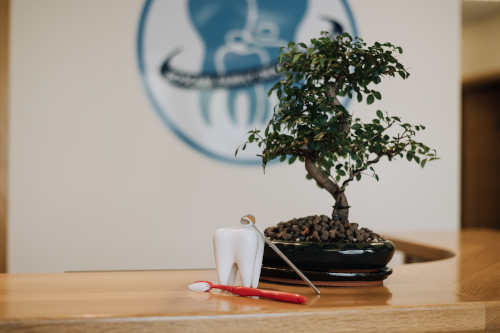
Wisdom teeth are the third molar teeth, also known by dentists as ''8's'' because of their position in the mouth. They are the last of the permanent teeth to develop.
Because the wisdom teeth are the last to develop and the last to come up (erupt) and because our jaws are not often large enough for all our teeth, there may not be enough space for them. They may develop in an abnormal alignment.
In addition to being deeply situated, they are often covered by a flap or a tag of gum making space between the wisdom tooth and the flap of gum is difficult to clean. Food and other debris known as plaque can accumulate and increase bacterial growth in these areas.
This may result in several different problems such as inflammation of the gum over or around the wisdom tooth (pericoronitis) which may be quite severe, decay (caries) in the wisdom tooth or the tooth in front, and gum disease (periodontitis) in the adjacent teeth.
At Roscam Family Dental Practice, our dentists will assess your wisdom teeth before tailoring your dental treatment plan for your wisdom teeth.
If you have pain or discomfort around your wisdom teeth it’s important to contact your dentist as soon as possible so that your smile can get the care that it needs.
Dental extractions may be indicated in some cases where a tooth is damaged or decayed beyond repair or in certain situations where gum disease has progressed to such an extent that the tooth structure can no longer be supported.
Other scenarios where a dental extraction may be required include for orthodontic or aesthetic reasons where crowding of the teeth is having an unavoidably negative impact on your smile.
If you’re unsure or nervous about the idea of a dental extraction, just let us know.
We are happy to discuss options and will do everything to ensure that your experience is as comfortable as possible.

© 2024 Roscam Family Dental Practice | All Rights Reserved
Website designed and created by Vision Digital 
© 2024 Roscam Family Dental Practice
All Rights Reserved
Website designed and created by Vision Digital 
| Cookie | Duration | Description |
|---|---|---|
| cookielawinfo-checkbox-advertisement | 1 year | This cookie is used to record the user consent for the cookies in the "Advertisement" category . |
| cookielawinfo-checkbox-analytics | 1 year | This cookie is used to record the user consent for the cookies in the "Analytics" category . |
| cookielawinfo-checkbox-necessary | session | This cookie is used to record the user consent for the cookies in the "Necessary" category . |
| CookieLawInfoConsent | 1 year | Records the default button state of the corresponding category & the status of CCPA. It works only in coordination with the primary cookie. |
| elementor | never | This cookie is used by the website's theme. It allows the website owner to implement or change the website's content in real-time. |
| Cookie | Duration | Description |
|---|---|---|
| VISITOR_INFO1_LIVE | 5 months 27 days | A cookie set by YouTube to measure bandwidth that determines whether the user gets the new or old player interface. |
| YSC | session | YSC cookie is set by Youtube and is used to track the views of embedded videos on Youtube pages. |
| Cookie | Duration | Description |
|---|---|---|
| CONSENT | 2 years | YouTube sets this cookie via embedded youtube-videos and registers anonymous statistical data. |